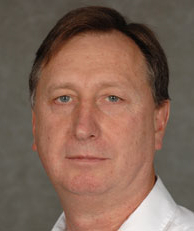Daniel_Djakiew
Daniel Djakiew
Australian academic
Daniel Djakiew (born 1956 in Newcastle, Australia) is a scholar, researcher, teacher, and tenured full professor in the Department of Biochemistry and Molecular & Cellular Biology, School of Medicine, Georgetown University, Washington DC.
This article has multiple issues. Please help improve it or discuss these issues on the talk page. (Learn how and when to remove these template messages)
|
At University of Newcastle (1978-1983), he conducted research on the evolution of the male reproductive tract as revealed by monotreme mammals. These studies showed that periurethral glands in the male monotreme represent a rudimentary disseminate prostate (prostate evolution in monotreme mammals),[1] and that the monotreme epididymis has many similarities to that of reptiles compared with scrotal mammals (epididymis evolution from reptiles to mammals).[2][3][4] After moving to Georgetown University (1983–present) he collaborated with Johns Hopkins University to demonstrate the physiological role of enhanced oxygen availability in the sperm storage region of the epididymis at cooler scrotal temperatures as a prime mover in the evolution of descended testes in mammals.[5]
He was an early adopter of tissue culture technology[6] as subsequently applied to dual chamber culture systems (1985-1991) to investigate polarized secretion in Sertoli cells[7] and prostate cells,[8] especially as they were used to examine paracrine factors in cell-to-cell interactions.[8][9]
Studies of prostate cancer (1990-2010) examined the expression of the neurotrophins and their receptors[10][11] (Trk family and p75NTR) in epithelial cells. These studies revealed the role of the p75NTR as a tumor suppressor[12] in prostate epithelial cells and that loss of p75NTR mRNA stability in tumor cells contributes to malignant transformation of normal cells to a cancer phenotype.[13] Moreover, treatment of tumor cells with selective non-steroidal anti-inflammatory drugs (NSAIDs) was shown to induce re-expression of p75NTR in tumor cells and induce apoptotic cell death.[14][15][16]
Djakiew received the young investigator of the year award from the Society for the Study of Fertility (Walpole Lecturer) at Oxford University in 1991. He also received the Distinguished Research in Reproductive Biology Award, University of Newcastle, Australia in 1991. He then was a recipient of a Research Career Development Award from the National Institutes of Health from 1993-1998. Subsequently, he received the Chaire de Professeur Invite, L’University d’Angers, France (1996-1997), and cited (November 2020) to be one of the World’s Top 2% Scientists by Stanford University.[17]
Djakiew has publications in 73 journals, five review publications and eight book chapters. He has supervised 7 Ph.D. students.
Teaching activities (1985–present) at Georgetown University include course director of cell biology/histology across multiple modules for 1st and 2nd year medical students as well as specific lectures therein. Additionally, lectures are given to post-graduate students in the Medical School at Georgetown University. Djakiew was also course director and lecturer of cell biology/histology held at the Prince William Campus of George Mason University for the GeorgeSquared program (2010-2023), a collaborative course of post-graduate studies between Georgetown University and George Mason University.
Djakiew was elected to the university wide faculty senate, and has been appointed to serve on a number of departmental, medical school, and university wide committees.
- Djakiew, D. (1978). Studies of the Male Reproductive Tract of the Echidna (Tachyglossus aculeatus) with particular emphasis on the Epididymis. Honors Thesis, University of Newcastle, Australia.
- Djakiew, D. & Jones R.C. (1981). Structural differentiation of the male genital ducts of the echidna (Tachyglossus aculeatus). Journal of Anatomy 132: 187-202.
- Djakiew, D. & Jones, J.C. (1983). Sperm maturation, fluid transport, and secretion and absorption of protein in the epididymis of the echidna, Tachglossus aculeatus. Journal of Reproduction and Fertility 68: 445-456.
- Djakiew, D. & Jones, R.C. (1982). Stereological analysis of the epididymis of the echidna (Tachyglossus aculeatus) and wistar rat. Australian Journal of Zoology 30: 865-875.
- Djakiew, D. & Cardullo, R. (1986). Lower temperature of the cauda epididymidis facilitates the storage of sperm by enhancing oxygen availability. Gamete Research 15: 237-245.
- Djakiew, D., Byers, S.W. & Dym, M. (1984). Receptor-mediated endocytosis of transferrin and alpha2-macroglobulin by rat epididymal epithelial cells in vitro. Biology of Reproduction 31: 1073-1085.
- Djakiew, D. & Onoda, M. (1993). Multichamber Cell Culture and Directional Secretion. In "The Sertoli Cell", Eds L. Russell & M. Griswold. Cache River Press, Clearwater, Florida, p181-194.
- Djakiew, D. & Dym, M. (1988). Pachytene spermatocyte proteins influence Sertoli cell function. Biology of Reproduction 39: 1193-1205.
- Djakiew, D., Pflug, B.R., Delsite, R., Onoda, M., Lynch, J.H., Arand, G. & Thompson, E.W. (1993). Chemotaxis and chemokinesis of human prostate tumor cell lines in response to human prostate stromal cell secretory proteins containing a specific nerve growth factor-like protein. Cancer Research 53: 1416-1420.
- Dalal, R. & Djakiew, D. (1997). Molecular Characterization of neurotrophin expression and the corresponding tropomyosin receptor kinases (trks) in epithelial cells and stromal cells of the human prostate. Molecular and Cellular Endocrinology 134: 15-22.
- Pflug, B. & Djakiew, D. (1998). Expression of p75NTR in a human prostate epithelial tumor cell line reduces NGF induced cell growth by activation of programmed cell death. Molecular Carcinogenesis 23: 106-114.
- Krygier, S. & Djakiew, D. (2001). The Neurotrophin Receptor p75NTR is a tumor suppressor in the human prostate. Anticancer Research 21: 3749-3756.
- Krygier, S. & Djakiew, D. (2001). Molecular characterization of p75NTR loss of the expression in human prostate tumor cells. Molecular Carcinogenesis 31: 46-55.
- Quann E., Khwaja, F., Zavitz, K.H. & Djakiew, D. (2007). The Aryl Propionic Acid R-Flurbiprofen Selectively Induces p75NTR-Dependent Decreased Survival of Prostate Tumor Cells. Cancer Research 67: 3254-62.
- Quann, E., Khwaja, F., & Djakiew, D. (2007). The p38 MAPK Pathway Mediates Aryl Propionic Acid-Induced messenger RNA Stability of p75NTR in Prostate Cancer Cells. Cancer Research 67: 11402-11410
- El Touny, L., Henderson, F., Djakiew, D. (2010). Biochanin A Reduces Drug-Induced p75NTR expression and Enhances Cell Survival: a New in Vitro Assay for Screening Inhibitors of p75NTR Expression. Rejuvenation Research 13(5): 527-537.
- Baas, J., Boyack, K., Ioannidis, J. (2020). Data for "Updated science-wide author databases of standardized citation indicators", Mendeley Data, V2, doi: 10.17632/btchxktzyw.2
